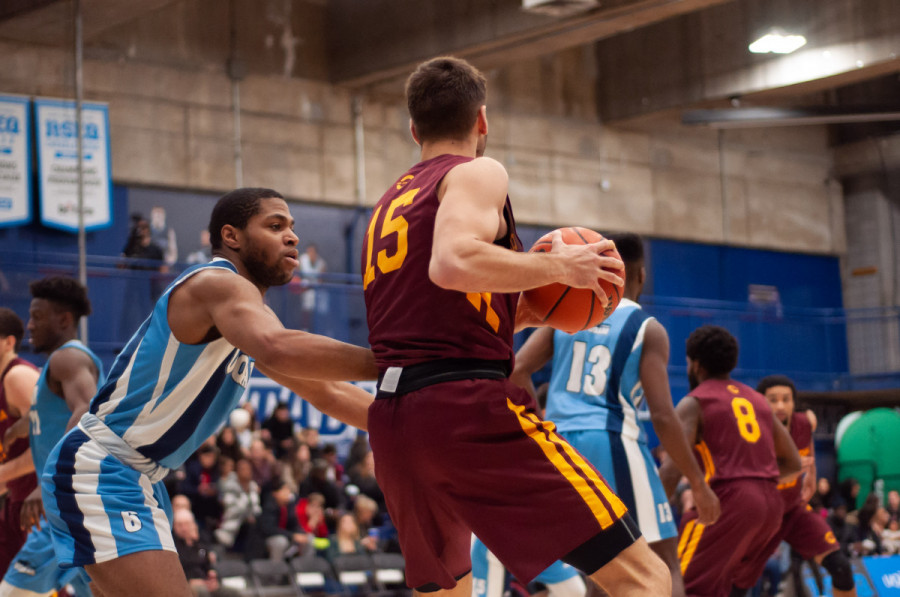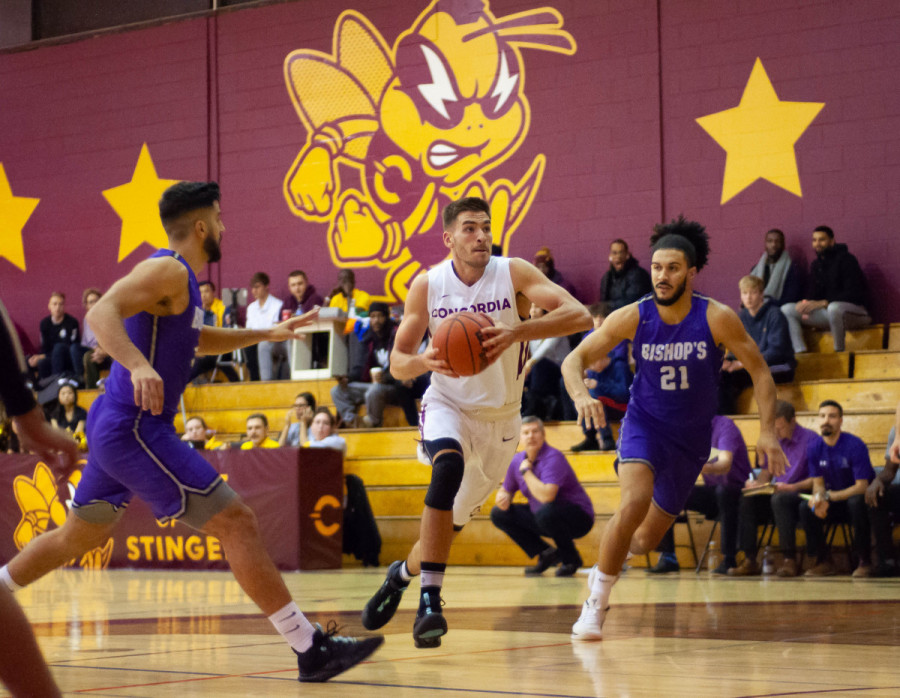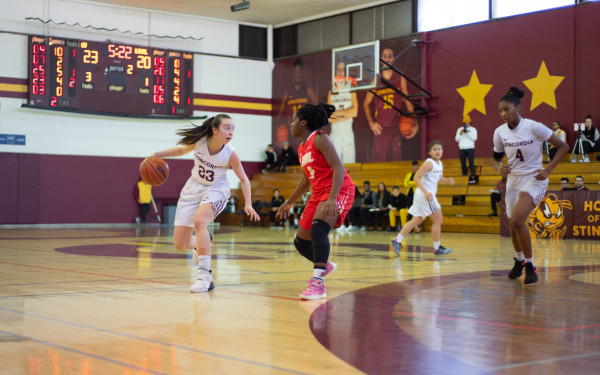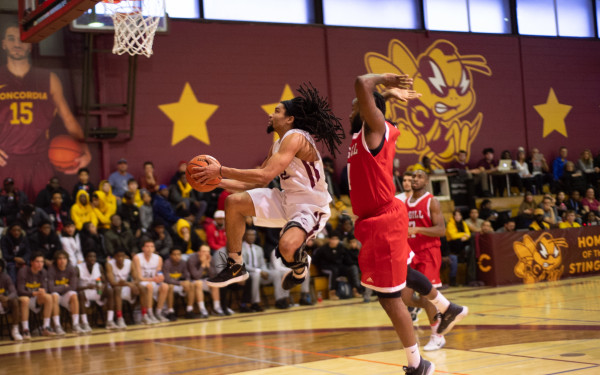Concordia’s Men’s Basketball Team is Building a Culture
After Their Provincial Championship Win Last Season, the Stingers Men’s Basketball Team is Focused on Continued Improvement.
The Stingers have gradually climbed their way to the top of the Réseau du sport étudiant du Québec since Rastko Popovic took over as head coach. Last season’s provincial championship was the culmination of years of grinding by the men’s basketball program, and no one knows that better than Popovic himself.
“It was progress. If you look at it throughout the first few years that I was here as a head coach, it takes time,” said Popovic. “It’s not easy to just come in and win […] It was definitely a great experience and I guess the most important part is to see that our program has improved.”
In his first two years at the helm, Concordia impressed in the regular season but fell short in the first game of the playoffs, losing to lower-seeded Université du Québec à Montréal Carabins in back to back semi-finals in 2015-2016 and 2016-2017.
The following year, the team took what Popovic described as a “positive step” by making it to the final, although they eventually lost to McGill.
Concordia eventually made it to the top of the mountain last season in a moment that would not have looked out of place in a sports movie script, defeating the team that had been a thorn in the Stinger’s side since the start of Popovic’s career: UQAM.
“It felt good to win the championship last year,” said fifth-year guard Cedrick Bryan Coriolan.
Coriolan, who has been with the team since the 2016-17 season, recognizes how long the team worked towards a provincial trophy, noting that Popovic ‘preached’ what it takes to win a championship since day one.
Popovic’s attitudes towards coaching and building a championship program have some shades of the NBA’s San Antonio Spurs Head Coach Gregg Popovich with whom he shares a lot more than a similar last name.
For the Spurs’ Popovich, team culture—on and off the court—is prized beyond the individual, and the Popovic at Concordia endorsed similar principles when it comes to his team.
“The last two years our team chemistry has been great and building team chemistry comes from building a team culture, where guys are all on the same page with the coaches,” said Popovic.
The only other people who use this word more than coaches might be the hip hop group Migos and anthropologists, but what exactly does culture look like in action?
Well, Popovic gives an example. Earlier this season, the Stingers were playing away at the University of Guelph. After they got back to Montreal, Popovic got a message on Facebook from a stranger who was at the same hotel as the Stingers in Guelph.
The message read: ‘Just wanted to let you know, so impressed with how well your team behaved. It was great to see they were polite and really respectful.’
A message like that shows Popovic that he and his coaching staff are doing the right thing with the program.
“It’s not easy,” said Popovic. “It takes some time and definitely took us a couple of years to get to that stage. I think guys who are with us in the program understand what we want from them and what’s expected of them when they put the Concordia jersey on.”
The Stingers culture is based on hard work, selflessness, and accountability on and off the court.
Players are taught the importance of representing themselves and their school with pride and dignity, and are held to a high standard—not just by the coaching staff, but by one another.
“I think guys who are with us in the program understand what we want from them and what’s expected of them when they put the Concordia jersey on.”
— Rastko Popovic
Last year’s team boasted a crop of experienced players who had come up within the coach’s system and grown together through the losses and heartbreaks of years past.
“One of the key things for us was we had a great group of veterans. So a group of guys that have been there for four, five years and [were] used to the system, guys that always stick to the process […] We had a lot of veterans on the team, so the whole team knew what was needed to win,” said Coriolan.
The challenge for the Stingers—if they want to return to their championship ways this year—will be replacing some of those veterans who are no longer with the team, and trying to bring the Stingers’ new crop of players up to speed.
“We lost two fifth-year players […] We have a lot of rookies on the team and a lot of young guys that came straight out of high school […] a lot of guys on the team are actually 17 years old, 18 years old,” said Coriolan.
One loss stings more than others: point guard Ricardo Monge. Monge was the team’s assists leader (5.5 per game) and second-highest scorer on the team (15.5 points per game).
He finished up the final year of his U Sports career with a provincial championship, first-team all-star honours, and a league MVP award.
The team has seven first-year players on the squad, and after this season, will lose both their starting guards, Coriolan and fellow fifth-year Adrian Armstrong.
Losing your starting point guard would have serious repercussions for any team, especially when that point guard is a player of Monge’s calibre. Luckily for the Stingers, they have the luxury of being able to transition the position to someone like Coriolan who knows the team inside out.
He was Monge’s backup for three years and that experience has been crucial to his own development.
“All my years, I’ve been playing behind [Monge]. So I’ve learnt a lot from him. We’ve never been on the same team in practice […] I always had to guard him, so that made me improve a lot as a player,” said Coriolan.
“I just embraced the challenge that the former MVP of the league and fifth-year point guard [is] gone and [that] now it’s my turn to step up.”
Monge’s departure—along with that of veteran guard Garry Merisier—not only left gaps on the box score but in the locker room as well.

“That’s why you build a team and try to make sure the players get better year in year out […]You have to build players and give them opportunities to learn and make mistakes,” said Popovic.
“Every year is going to be like that. It’s a cycle and that’s why you have to keep coaching and keep recruiting and keep hoping it can get better and they can step in when their name is called.”
The culture of “team above self” is reflected in the recruitment strategy. “It’s not always about having the most talented guys,” said Popovic. “We want guys who are coachable.
That’s one of the most important things to me as a head coach, is guys who are willing to come here and learn and get better.”
Coriolan and Armstrong hope to fill those gaps this season by setting a good example for the rookies and the upperclassmen who will take the mantle of leaders next season.
“Guys that come out of high school or CEGEP, they don’t know what to expect or how it’s going to be. So us showing the example makes everybody see what’s necessary. Maybe not [to] win every year, but at least have a chance to win it every year,” said Coriolan.
The aim at the end of the season is clearly another championship, but what’s important is what happens after the game and off the court.
“My goal as a coach is to get them ready for real-life after the university and basketball,” said Popovic.
Players are held to high standards to teach them lessons in basketball that transfer to life. This is something the team takes to heart and the veterans believe as well.
“Our role is also holding guys accountable […] making sure that if coach says we have to do this, everyone is on the same page,” said Coriolan. This extends to study hall as much as it does to practices or games.
As for the championship this season, the Stingers are taking it one game at a time. “There’s no guarantee when it comes to that one playoff game in March. You gotta show up and be better than the other team,” said Popovic.
The Stingers closed out 2019 second in the RSEQ but Popovic doesn’t want to be thinking about Nationals right now.
“What we try to focus on day by day is [building] enough good habits to give ourselves a chance at the end of the season.”






_600_375_90_s_c1.jpg)
(3of3)_600_375_90_s_c1.jpg)